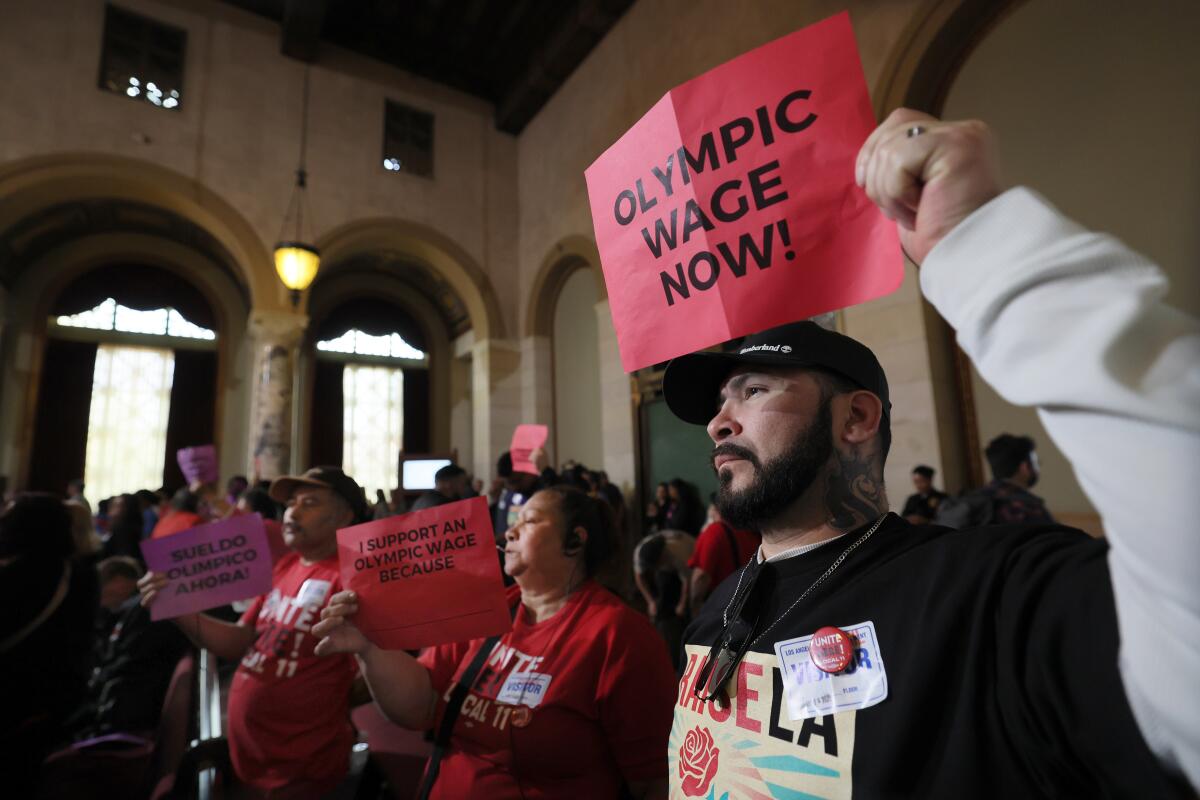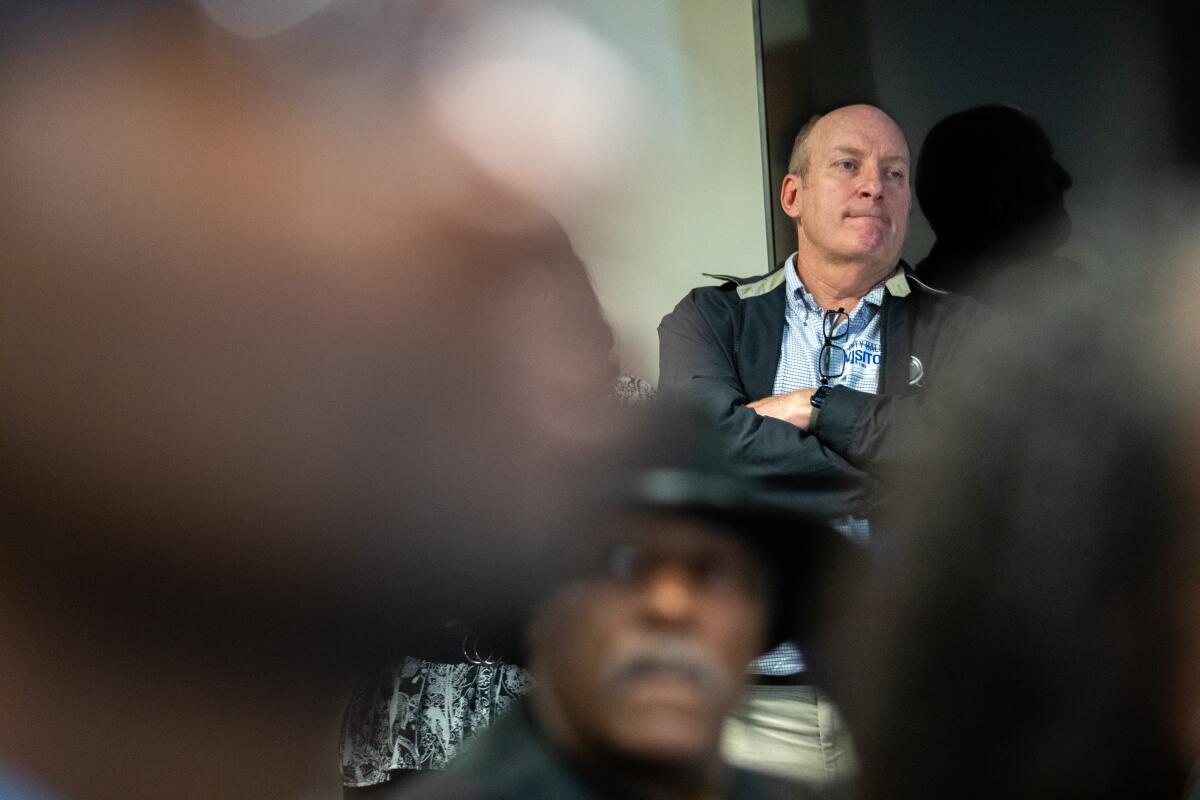-
How to Watch Chelsea vs AC Milan: Live Stream Club Friendlies, Start Time, Lineups, TV Channel - 9 mins ago
-
Take this week’s American Culture Quiz and test yourself on park pioneers and baseball bests - 30 mins ago
-
How UCLA’s research faculty is grappling with Trump funding freeze - 41 mins ago
-
LIV Golf Chicago: Round 2 Highlights | LIV on FOX - 42 mins ago
-
Justin Rose Opens Up About Battling Illness During FedEx St. Jude Championship - 47 mins ago
-
UEFA criticized over tribute after soccer star is killed in Gaza - 49 mins ago
-
Will we ever get enough housing? Here are reasons to say ‘yes’ - about 1 hour ago
-
LIV Golf Chicago: Dean Burmester Leading After Round 2, Team Leaderboard Is Tight - about 1 hour ago
-
Mom Changes Baby’s Diaper in SUV Trunk—Stunned by What Stranger Yells - about 1 hour ago
-
Lindsay Lohan raises son in Dubai to escape paparazzi harassment - 2 hours ago
L.A. passed a $30 hotel minimum wage. Then came the ballot measure fight
It’s the summer of the burn-it-down ballot measure in Los Angeles.
For the past three months, labor unions and business groups have been locked in a protracted fight over a law, approved by the City Council in May, hiking the minimum wage for hotel employees and workers at Los Angeles International Airport to $30 per hour by 2028.
Both sides, in an attempt to gain the upper hand, have proposed ballot measures that, if approved, would disrupt the city in enormous ways, leaving an impact that would go well beyond the hourly pay of housekeepers, valets and LAX skycaps.
Unite Here Local 11, the politically powerful union that represents hotel and restaurant workers, is looking to put four ballot proposals before voters that, according to critics, would wreak havoc on the city’s economy. Business leaders, in turn, are under fire for filing a ballot petition to repeal the city’s $800 million business tax — a move denounced by city officials, who say it would gut funding for police and other essential services.
L.A. City Councilmember Monica Rodriguez said the arms race between business and labor is spinning out of control, in large part due to a lack of leadership at City Hall. As the battle intensifies, no one has been willing to broker a compromise between the two sides, said Rodriguez, who voted against the $30 minimum wage.
“We’ve entered this War of the Roses because we don’t have anyone bringing the parties into a room to negotiate a balance that works for everybody, that can help sustain business and address the needs of the workers,” she said. “In the absence of that, everyone is taking matters into their own hands — and that is reckless, sloppy and dangerous.”
Los Angeles City Councilwoman Monica Rodriguez, pictured in 2020, said the ballot measure battle between organized labor and the business community is getting out of control.
(Irfan Khan/Los Angeles Times)
Asked about those assertions, aides to Mayor Karen Bass said she has “brought new business investments” to L.A. and “is in discussion with labor and business groups on a wide range of issues.”
“Maybe [Rodriguez] is referring to her own lack of leadership to move her council colleagues towards a legislative outcome,” said Zach Seidl, a Bass spokesperson.
City Council President Marqueece Harris-Dawson was more diplomatic, saying in a brief statement: “People are working hard to figure out solutions, stay tuned.”
The ballot battle began with little fanfare in May, when a group representing airlines and the hotel industry filed paperwork for a voter referendum on the $30 per hour hotel and airport minimum wage, a few weeks after it was passed by the City Council.
Business leaders had argued that the minimum wage hike, along with a healthcare payment that is expected to exceed $8 per hour next year, would trigger layoffs and the closure of restaurants, hotels and airport concessions.
Organizers with Unite Here Local 11, who had fought for at least two years to secure the higher wage, responded with their own package of ballot proposals, including a plan to require a citywide election on the development or expansion of large hotels, concert halls, museums, sports facilities, convention center space and — according to city leaders — some 2028 Olympic venues.

Manny Morales, an employee at Flying Food Group at LAX, showed up at City Hall in May to demand a boost in the minimum wage for hotel and airport workers.
(Allen J. Schaben/Los Angeles Times)
Unite Here, which has a history of knocking on doors for its ballot measures and favored candidates, also submitted a voter petition to expand the $30 minimum wage to every worker in L.A. And it filed two measures targeting outsize executive pay.
One would require companies with a pay disparity of more than 100 to 1 between CEOs and their median worker in L.A. to secure voter approval to use space at the harbor, airport, convention center and other city agencies. The other would hike the city business tax on such companies.
After Unite Here filed its four petitions, business leaders raised the stakes even further, turning in a proposed measure to repeal the city’s business tax.
That effort, if approved by voters, would provide financial relief for businesses but also strip more than $800 million from the city budget, or about 10% of the general fund, which pays for police and fire protection.
Bass warned that the measure would eviscerate funding for public safety and other services. David Green, president of Service Employees International Union Local 721, called the move “irresponsible” and “retaliatory” — and said it would hit a city already reeling from a $1 billion budget shortfall.
“If you’re part of this community … why would you go to the voters on something that’s going to hurt anybody that lives in and around the city of Los Angeles?” he asked.
Business leaders have defended their efforts, saying a repeal would spur economic activity and generate income for the city.
Christopher Thornberg, whose L.A.-based research firm produces economic studies for industry groups and government agencies, voiced skepticism about the repeal effort, saying there are other, much bigger issues holding the city’s economy back. Still, he wasn’t surprised to see business leaders start playing hardball.
At City Hall, he said, they have been effectively locked out of the conversation for years — and desperately need a way to gain “some sort of leverage” with elected officials.
“Perhaps the [business tax] is that leverage, to get someone on the council to pay attention to them,” the economist said. “Because they’re not. They’re just not at the table.”
Thornberg, whose firm has issued critical assessments of minimum wage hikes, voiced concern about each of the Unite Here proposals. He warned that the plan to force hotels, sports arenas and other projects to go before voters would hurt the city’s ability to carry out “basic economic development.” He predicted that the proposed citywide minimum wage hike would drive businesses and their customers to other parts of Los Angeles County.
On top of that, Thornberg said, the proposal targeting exorbitant CEO pay would likely shut down location shoots in L.A., since it would apply to companies seeking film permits on city property.
“Unite Here has built a reputation on the idea that they are the most … crazy people in the room and will blow up everything to get their way,” he said. “What they’re doing is clearly living up to that reputation.”

Councilmember Hugo Soto-Martínez, pictured in 2023, is interested in a union proposal to hike the minimum wage of every Angeleno to $30 by 2028.
(Jason Armond/Los Angeles Times)
Maria Hernandez, a spokesperson for Unite Here, pushed back on claims that the union is being reckless. With workers struggling to pay for food and housing and demoralized over President Trump’s sweeping immigration crackdown, the fight to preserve the $30 per hour tourism minimum wage has received a groundswell of public support at a bleak time, she said.
“People might say it’s crazy or insane, but it’s actually courageous and bold, and it should be inspiring to people more than anything,” she said, adding: “The community … is looking to feel hopeful, to win something, when everything just feels like it’s going to hell.”
Councilmember Hugo Soto-Martínez, who championed the $30 tourism minimum wage, disagreed with the assertion that the ballot measure battle is out of control. A former Unite Here organizer, he said he is inclined to support the citywide $30 minimum wage.
Soto-Martínez also voiced interest in the union’s push for higher city taxes on companies with exorbitant CEO pay. He had a dim view of the push to repeal the tourism minimum wage, calling it “despicable.”
Airline companies, working alongside the hospitality industry, poured millions of dollars into its signature drive, gathering more than 140,000 signatures within 30 days, he said.
“It’s just another example — and the public should know this — of corporations feeling like they can do whatever they want because they have those resources,” he said.
The prospects for the repeal are uncertain. Officials with the Los Angeles County Registrar-Recorder/County Clerk are still working to determine whether the measure has enough valid voter signatures to qualify for the ballot.
Organizers with Unite Here, as well as Service Employees International Union-United Service Workers West, which represents LAX employees, led a vigorous campaign to convince voters who regretted signing the petition, saying they had been misled by signature gatherers, to withdraw their names.
Last week, county officials reported that they had analyzed a sample of 7,040 signatures, or 5% of the 140,774 submitted by the airline and hotel industry group. The officials found 4,373 valid signatures, shy of the roughly 4,600 needed to avoid a full hand count.
Among the invalid signatures were 853 withdrawn by voters, making union leaders more confident about keeping the referendum from reaching the ballot.

Unite Here Local 11 co-president Kurt Petersen, pictured at City Hall in 2023, said his union is pressing ahead with ballot proposals to hike the citywide minimum wage, restrict city approval of hotels and crack down on exorbitant CEO pay.
(Brian van der Brug/Los Angeles Times)
“I wouldn’t want to be in their shoes today. Their numbers are not in a comfortable range,” said Kurt Petersen, co-president of Unite Here Local 11. “The odds are better that they are struck by lightning than get [their measure] … on the ballot.”
Even if the referendum fails to qualify, Unite Here Local 11 plans to press ahead with its four ballot initiatives. Petersen said his union’s members have been invigorated by the fight to protect the $30 tourism minimum wage — and will soon begin gathering signatures for the other proposals.
“We know our issues are extremely popular. People really do believe workers need to make more money and CEOs need to pay more taxes,” he said.
Stuart Waldman, president of the Valley Industry and Commerce Assn., said he believes voters will reject those measures, once they learn the effect will be to “force companies to leave L.A.” The proposals from Unite Here’s leaders are less about supporting workers and more about sending a message, Waldman said.
“They want to exact retribution and revenge on anyone who challenges them … and they don’t care how many jobs it costs to do it,” he said.
Source link































